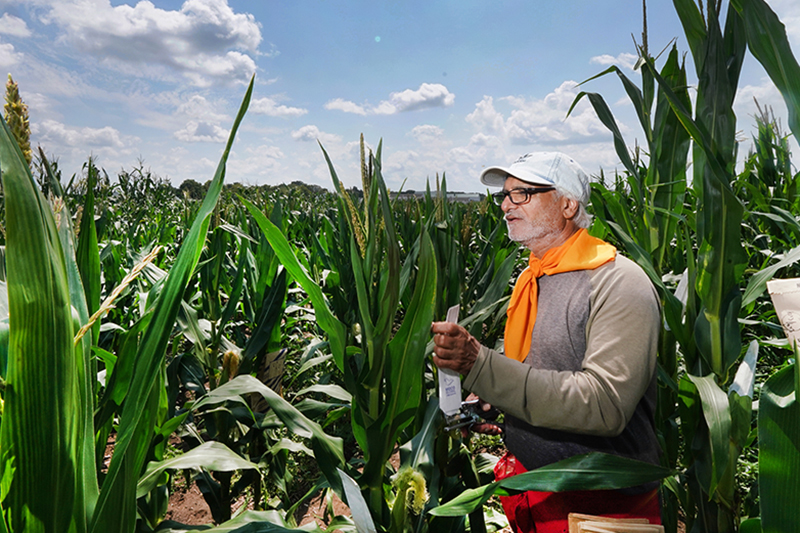West Lafayette, Indiana, USA
January 25, 2024
College of Agriculture researcher developed D16 through traditional breeding techniques

Guri Johal, professor of botany and plant pathology in Purdue University’s College of Agriculture, examines a short-stature corn inbred called D16. The Purdue Innovates Office of Technology Commercialization has issued a worldwide, exclusive license for D16 to Romney, Indiana-based Ag Alumni Seed. (Purdue Agricultural Communications photo/Tom Campbell)
The Purdue Innovates Office of Technology Commercialization has issued a worldwide, exclusive license for a short-stature corn inbred called D16 to Romney-based Ag Alumni Seed.
The license is limited to popcorn and doesn’t apply to dent corn, field corn or sweet corn.
Traditional breeding techniques
Ag Alumni Seed has supported multiple research projects at Purdue University with both financial and in-kind contributions — such as the use of land, equipment and facilities. Jay Hulbert, the company’s president and CEO, said development of D16 began with research that Guri Johal conducted at the company’s Romney facility a decade ago. Johal is a professor of botany and plant pathology in Purdue University’s College of Agriculture.
“D16 is not a GMO trait. Guri converted multiple elite Ag Alumni Seed proprietary popcorn inbreds to incorporate into D16,” Hulbert said. “The feature was developed using time-honored traditional breeding techniques without incorporating any foreign DNA into the corn.”
Benefits of D16 to farmers
Hulbert said a shorter corn plant like D16 has advantages over traditional corn plants.
“A shorter plant is less likely than a taller plant to break, fall over or ‘lodge’ under stress caused by high winds or other severe weather,” he said. “In a food crop like popcorn, lodging increases the risk of the grain being contaminated by dirt or other foreign materials; D16 may be at lower risk of contamination than traditional corn. In addition, corn can become so tall that it’s difficult for farmers to work in the field except with specialized high-clearance equipment.”
D16 may also enhance yield reliability for farmers.
“Shorter-stature corn may improve sustainability by allowing farmers to grow more plants per acre, improving yield and utilizing water and fertilizer more efficiently,” Hulbert said.
Developing D16 further
Hulbert outlined Ag Alumni Seed’s next steps with D16.
“Using our Southern Hemisphere facilities, we will fast-track new hybrids with this shorter-stature feature. The new hybrids will be tested side by side with our current hybrids in U.S. trials this coming summer,” Hulbert said. “Based on the results of those trials, we’ll make decisions on conducting further trials and commercializing D16 hybrids.”
About Ag Alumni Seed
Ag Alumni Seed is a leading breeder, producer and marketer of hybrid popcorn seed. Building on the heritage of Purdue University, our research team has nurseries in three widely varied climatic areas augmented by trials on six continents. This gives Ag Alumni Seed maximum genetic diversity, allowing us to develop high-performing popcorn hybrids that will meet customer needs for regional adaptation, maturity, disease resistance, yield, kernel size, kernel color, popping expansion and other characteristics now and into the future.
About Purdue Innovates Office of Technology Commercialization
The Purdue Innovates Office of Technology Commercialization operates one of the most comprehensive technology transfer programs among leading research universities in the U.S. Services provided by this office support the economic development initiatives of Purdue University and benefit the university’s academic activities through commercializing, licensing and protecting Purdue intellectual property. In fiscal year 2023, the office reported 150 deals finalized with 203 technologies signed, 400 disclosures received and 218 issued U.S. patents. The office is managed by the Purdue Research Foundation, which received the 2019 Innovation and Economic Prosperity Universities Award for Place from the Association of Public and Land-grant Universities. In 2020, IPWatchdog Institute ranked Purdue third nationally in startup creation and in the top 20 for patents. The Purdue Research Foundation is a private, nonprofit foundation created to advance the mission of Purdue University. Contact otcip@prf.org for more information.
About Purdue University
Purdue University is a public research institution with excellence at scale. Ranked among top 10 public universities and with two colleges in the top four in the United States, Purdue discovers and disseminates knowledge with a quality and at a scale second to none. More than 105,000 students study at Purdue across modalities and locations, with 50,000 in person on the West Lafayette campus. Committed to affordability and accessibility, Purdue’s main campus has frozen tuition 13 years in a row. See how Purdue never stops in the persistent pursuit of the next giant leap, including its first comprehensive urban campus in Indianapolis, the new Mitchell E. Daniels, Jr. School of Business, and Purdue Computes, at https://www.purdue.edu/president/strategic-initiatives.